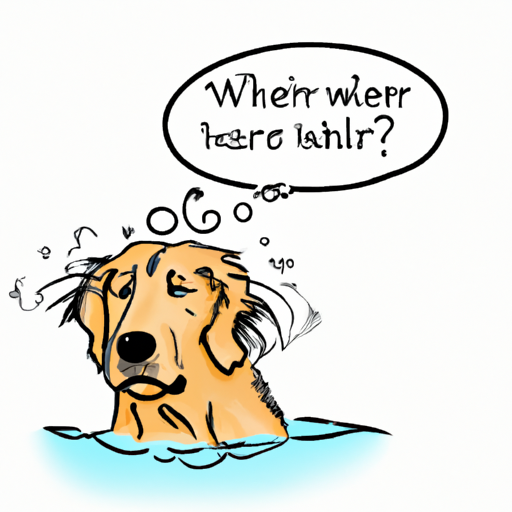As a caregiver to your beloved canine, you may have noticed your dog shaking often and wondered why. In this article, we will explore this behavior in detail, discussing the common reasons and what you should do about it.
1. They’re Wet
Dogs are known for their love of water, but once they get wet, their first instinct is to shake off the excess water. This action is not just about comfort, but also about survival.
Dogs can get hypothermia if their fur remains wet for too long in cold conditions. The shaking is a quick and effective way to remove up to 70% of the water from their fur, according to research conducted by Andrew Dickerson at Georgia Institute of Technology.
2. They’re Cold
Just like how you shiver when you’re cold, dogs also shake to warm themselves up. When dogs are cold, their bodies respond by shaking to generate heat through muscle activity. This is a completely normal behavior. However, prolonged exposure to cold can lead to hypothermia. If your dog continues to shiver even after being moved to a warmer environment, it could be a sign of illness.
3. They’re Nervous or Excited
Dogs often shake or shiver due to strong emotional responses. This could be because they are anxious, excited, or fearful.
For instance, you might notice your dog shaking:
- At the vet’s office
- During thunderstorms
- When meeting new people or dogs
- When they’re excited about a walk or meal
4. They’re Experiencing Pain or Illness
Shaking could indicate that your dog is in pain or feeling unwell. It’s important to pay attention to other signs of distress such as loss of appetite, changes in behavior, or physical symptoms like vomiting or diarrhea.
Some common illnesses that cause dogs to shake include:
- Kidney disease
- Poisoning
- Neurological disorders
- Certain types of cancer
If your dog is shaking and shows other signs of illness, it’s crucial to get them to a vet as soon as possible.
5. They’re Older
Just like humans, dogs can develop tremors as they age. These tremors are usually harmless and a normal part of aging. However, if the shaking is accompanied by other symptoms or if it’s affecting your dog’s quality of life, it’s important to consult with your vet.
| Age-Related Conditions | Symptoms |
|---|---|
| Arthritis | Difficulty moving, stiffness, limping |
| Cognitive Dysfunction | Confusion, changes in sleep patterns, loss of house training |
| Generalized Tremor Syndrome | Shaking or trembling, trouble walking |
Frequently Asked Questions
1. How can I tell if my dog’s shaking is serious?
If your dog is shaking, look for other signs of distress or discomfort. If the shaking is accompanied by symptoms like vomiting, diarrhea, loss of appetite, or unusual behavior, it’s time to consult a vet.
2. Can I do anything to stop my dog from shaking?
The best thing you can do is to understand the root cause of the shaking. If your dog is cold, provide them with a warm blanket or move them to a warmer environment. If they’re anxious, work with a trainer or vet to address their anxiety.
3. Is shaking normal for older dogs?
Yes, shaking can be a normal part of aging for dogs. However, if it’s severe or accompanied by other symptoms, it could indicate a medical problem. It’s always best to consult with a vet if you’re concerned.
4. Can dogs shake due to anxiety?
Yes, dogs can shake or shiver when they’re anxious or stressed. This is a physical response to emotional distress.
5. What should I do if my dog won’t stop shaking?
If your dog’s shaking is persistent and you cannot identify the cause, it’s best to bring them to a vet. It could be a sign of a more serious health issue.
In conclusion, shaking in dogs can be a normal behavior or a sign of an underlying condition. As a caregiver, understanding why your dog might be shaking is crucial to ensuring their wellbeing. Always consult with a vet if you’re unsure or concerned.



